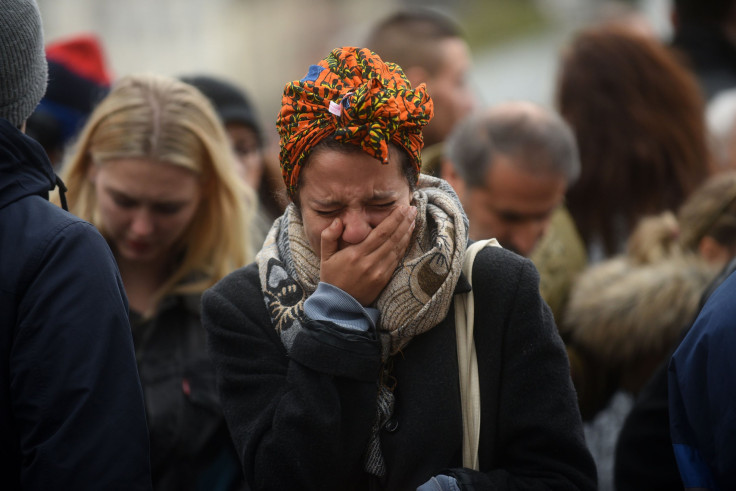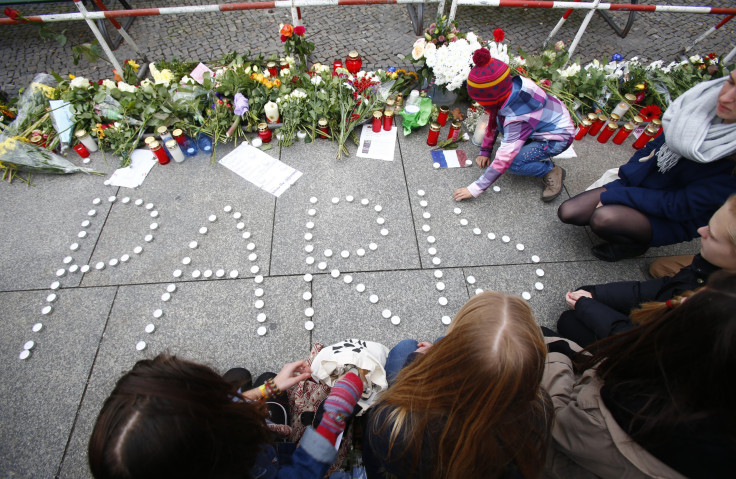Paris Attacks: Parisians Seek Normalcy In Wake Of Terror Attacks

The skies cried Saturday morning in the wake of the Friday-night carnage in Paris that left scores dead at the hands of terrorists who detonated suicide bombs at the city's soccer stadium and opened fire with guns at restaurants and a nightclub. "I woke up this morning at 8, and I cried," said Rita Dagher, 48, a Lebanese native who has lived in Paris since she was 16. "I cried for a couple of hours ... reading the news and digesting what happened and getting messages from friends all over the world."
Under cloudy skies bulging with the threat of rain, Parisians attempted to return to some sense of normalcy. But France's borders were closed. So were attractions in the city, such as the Eiffel Tower and the Louvre. Sporting events in the region were canceled. As was the exhibition of photographs Dagher and her American friend Laura Nix had been planning to attend.

"We're about to go out and have the rest of the day normally," Nix, 48, a documentary filmmaker based in Los Angeles, said in a telephone interview with International Business Times. "We're resolved that's the best way to respond."
Nix arrived in Paris Friday, just hours before the terrorists unleashed their attacks.
"I was at dinner with friends in the 5th arrondissement [district]. It's within walking distance, a 15- to 20-minute walk. And I noticed on my cellphone -- I have New York Times alerts. I didn't understand what was happening. ... We asked the waiter. ... My friend explained how close it was to where we were. We finished our dinner, we paid our bill and we walked home. ... We watched the news for a very long time."
Dagher works near the Stade de France, the soccer stadium where the initial explosions were set off. "It's the subway stop [where she gets off and] goes to work every day. She's been to the nightclub. She's quite worried she might know people there, and she's angry but also resolved to have a normal day today as much as possible."
Nix added, "We're in shock, and we're devastated, but we really need to think about how we can curb this phenomenon."

Even before Friday night's attacks in Paris, Dagher was upset in the wake of this week's suicide bombings in the Shiite Muslim section of Beirut where she grew up.
"This is all very apocalyptic to me," Dagher said by phone. "The world has gone crazy. ... It's irreversible. How do we tackle this? How do we solve this problem? We need to sit back and reflect on what is possible to do to stop this state of the world. ... I feel helpless and confused."
Dagher said the West must rethink its foreign policy, especially regarding Qatar, Saudi Arabia and the United Arab Emirates, countries "that are more than ambivalent in their relationship to terrorism."
"These countries like Saudi Arabia are spreading these doctrines -- it's [terrorism is] the result of these doctrines. It's the manifestation of these doctrines -- the Salafis, the Wahabis. It's really part of the problem," Dagher said.
Dagher said there's a qualitative difference between the terrorism being seen now and that which occurred in the 1960s and 1970s.
"Now it's total chaos," she said. "There's no justification. ... There's no way to grasp what's happening. It's become too confusing. Who are the bad guys and how can we stop them? That is the real question."
© Copyright IBTimes 2025. All rights reserved.






















